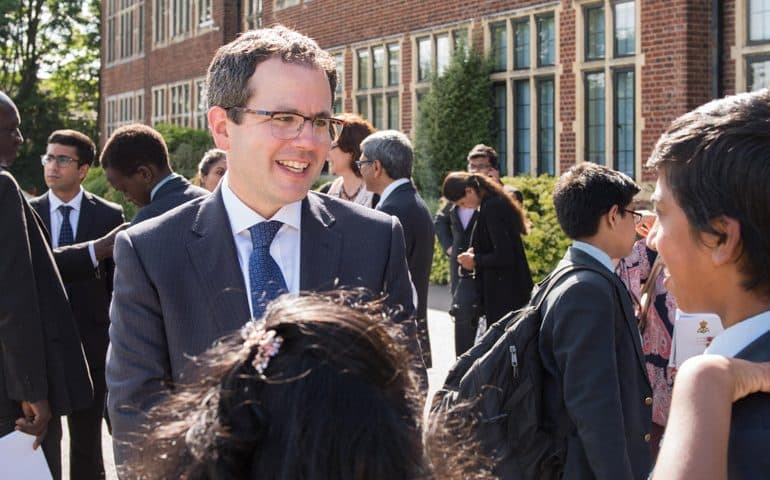
While life at Queen Elizabeth’s School has continued calmly this term, the country at large has been beset by a string of terrible episodes, including terrorist outrages and the fire at Grenfell Tower in North Kensington. On a number of occasions, we have joined the rest of the nation in honouring the dead and remembering the injured and the bereaved through the observance of a minute’s silence. Such events inevitably leave their mark on young and old alike.
Against this backdrop, I am acutely conscious that young people today face many challenges to their mental and emotional wellbeing in a world that has changed considerably since their own parents were children. The curtailment of outdoor play and the prevalence of family breakdown have been cited by commentators as ‘dehumanising’ factors deleterious to a child’s ability to form loving relationships and to trust people. And while technology has undoubtedly brought benefits, an addiction to smartphones, to social media and to computer games is too often replacing the normal human interaction that previous generations took for granted, reducing young people’s capacity for empathy and leaving them socially isolated. Moreover, research is still uncovering the factors which account for the tendency of some older male adolescents to adopt unhelpful, and even risky, behaviours; the key is likely to lie in understanding how a combination of genes, childhood experience and the environment a boy had in early adolescence affect his behaviour at a time when the brain is undergoing physiological change.
Now, more than ever, it is important that teachers, parents and the boys themselves pay due regard to the mental and emotional health of our pupils. To this end, we already have pastoral strategies in place and are also currently developing a new mental wellbeing policy for the School. Pupils are encouraged to engage with political and social issues, as demonstrated by this term’s mock General Election and by tutor-time discussions that have focused on the recent tragedies. Form tutors have been working on developing in pupils the seven ‘learnable skills of resilience’. Alongside such collective approaches, more intensive support is available for individuals, whether to deal with an existing problem or to intervene pre-emptively at an early stage.
Interestingly, several of our alumni have touched on such themes recently. At our recent Junior Awards Ceremony, the guest of honour, Prashant Raval (OE 2003-2010), spoke about the lessons he had learned from both successes and failures. He underlined the importance of hard work and preparation and of savouring achievements when they come. But, recalling that he had been “quite the perfectionist” while a pupil himself, he had some further wise counsel for our young award-winners: “What I’ve realised, alas, is that in the real world, it is nigh-on impossible to achieve 100% in everything, all of the time, and you will make mistakes along the way. Don’t be afraid of these mistakes – instead, embrace them as opportunities to learn.” Prashant took a First in Economics at University College London and then worked initially as an analyst with UBS Investment Bank. After that, he became a Senior Commercial Manager for Aston Villa Football Club, before taking up his present senior post in Operations for Uber. “At the age of 24, it’s perhaps slightly unusual that I’m already in my third full-time job. But this professional diversity has enabled me to begin to truly understand what makes a job more fulfilling, rewarding and enjoyable than another – and that is the scope for learning,” he said.
Our guest speaker at the Thanksgiving Service on the morning of Founder’s Day, Ashley-James Turner (OE 2001–2008), rightly reminded us that the commitment, sacrifice and diligence of QE parents are core not only to the success of their own sons but of the School in toto. After welcoming many Old Elizabethans on Founder’s Day, I look forward to seeing even greater numbers during the Autumn Term at the OE Association dinner – where our speaker is Robert ‘Judge’ Rinder (1989–1994) – at the Careers Convention and at the Carol Service. It has also been great to connect with many old boys on LinkedIn recently: if you haven’t found me there yet, do please feel free to look me up – I will be happy to hear from you.
More than any other event in our calendar, Founder’s Day represents an opportunity for our whole School community – past, present and even future – to come together. It thus seemed entirely appropriate that this year’s event coincided with The Great Get Together, a weekend of community events around the country inspired by Brendan Cox, the husband of Labour MP Jo Cox, who was murdered last year by a political extremist.
In these troubled times, I have been heartened by the poetic endeavours of Old Elizabethan George ‘the Poet’ Mpanga (OE 2002–2009), who put his mastery of language to service in producing a poem to encourage people to report hate crime, which ends with the words “you can’t fight violence with silence”. The poem, which was commissioned by the Equality and Human Rights Commission to coincide with the anniversary of Jo Cox’s death, reminds us of the need to be vigilant against all forms of hatred. Like many of our old boys, by giving his time to causes greater than himself, George is fulfilling the tenet of the QE mission statement that Elizabethans should seek to “make a contribution to society rather than pursuing only personal gain”.
I wish all Old Elizabethans a peaceful and enjoyable summer.
Neil Enright
